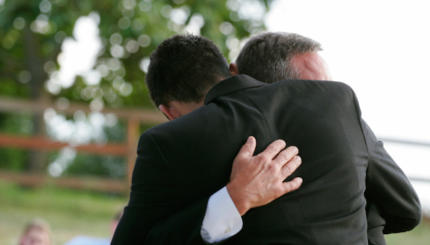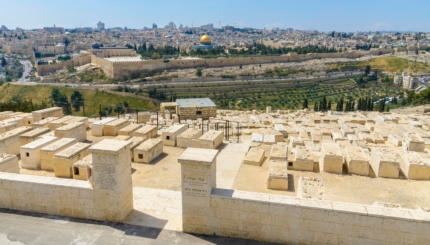Jewish tradition understands the quandary of those who want to comfort mourners but cannot articulate words of comfort, so it provides a formulaic religious response to what is essentially an inexpressible emotion. Thus, consolers are able to express their sentiments in a soothing and spiritual way without fear that they might become tongue-tied in the face of irretrievable tragedy.
The Crown Jewel Of Jewish Consolation
“May God console you among the other mourners of Zion and Jerusalem (Ha’makom yenahem etkhem betokh she’ar avelei Tziyonvi’Yerushalayim).”
This traditional farewell of mourners instituted by Judaism is carefully constructed and profound. It conveys positive feeling with layers of ever-deepening meaning, even for those who don’t understand the literal Hebrew or who can hardly remember the words or even pronounce them correctly.
This formula also relies on God to take primary responsibility for consoling the mourners — to comfort is human, to console divine. Mourners might find it hard to fully accept a human being’s personal words, but they may feel more readily consoled by an invocation of God’s participation in mourning. The ideas embedded in this phrase are a summary of the religious and spiritual devices the tradition uses to bring the mourner some consolation.
Ha’makom
In this blessing, God is referred to by a specific and little-known name, “Ha’makom,” which translates simply as “The Place.” God is referred to as “place” because space affirms stability, solid ground, rootedness—the opposite of ethereal. A “space” term is used instead of a “time” term such as the Tetragrammaton–the four-letter word for God’s name, which signifies eternity—because mourners need to inhabit the here and now.
Space is the framework for grievers—the place of shiva [the week-long mourning period], changing one’s usual place at services. Time, in contrast, is infinite, mercurial, and unmanageable.
Further, the use of the word “makom” averts a possible negative response from mourners. Calling God by this consoling name avoids thrusting God’s more familiar, awesome name into the face of mourners who have been shaken to their roots by God’s irreversible decree. That is, in fact, also the reason for not greeting mourners with the usual “shalom,” since shalom is another name for Almighty God, a name hard to embrace at this disquieting time.

Yenahem
The second word of the classic farewell blessing is the Hebrew word for “console,” but it is not one always used for this purpose in the Bible. When the Israelites betray God’s trust, God is depicted as va’yenahem—”regretting” the creation of human beings or “regretting” taking Israel out of slavery. This seems to have everything to do with God’s undergoing a change of mind, as it were, and nothing to do with God’s consoling.
But we need to understand a link that is not immediately visible. Intrinsic to all consolation is a sense of deep regret. Regret gives rise to a need for change and triggers an acceptance of loss, which leads inevitably to profound consolation. It compels people to review, reassess, and readapt to a world that has permanently changed after a friend or relative has died. It points to a change in direction–adjusting to a new status and new relationships among all members of the family or business or inner circle, and submitting to self-transformation, if that is possible.
Betokh She’air Avelei Tziyon vi’Yerushaliyim
The formula is incomplete, however, without its second half: “Among the other mourners of Zion and Jerusalem.” This phrase emphatically moves the consoler away from the natural tendency to focus solely on those presently grieving. It connects both the specific griever and grief in general in two salient and subtle ways.
First, the phrase broadens God’s consolation to include “other mourners” — of Zion and Jerusalem — thereby expressing a critical imperative in the process of grief work: the universal need for mourners to share their grief, the natural interconnectivity of all mourners. Grievers are not alone, and they must know this so that they do not feel singled out unfairly by God, specially targeted for suffering. The phrase also brings the mourners to the realization that death, in all its guises, is suffered by everyone, “other mourners,” and that it is an inherent quality of life.

Subliminally, yet another level of meaning is implied: Others are genuinely able to share their pain.
More subtly tucked into the folds of the phrase “the other mourners of Zion and Jerusalem” is the teaching that the mourners’ past grievous losses are connected with their present loss. Indeed, within our lifetime, we suffer and grieve for many losses: a loved one, a dear friend, a business relationship, a livelihood, or our prestige. Or we may mourn a ravaged community, perhaps a sacred city like Jerusalem, or a devoutly held idea like Zion. Many never resolve old grief; horrific incidents of the past may cast their long shadow over a new trauma. Even night has its shadows.
Grieving should be seen as an ongoing process of acknowledging cumulative misfortune rather than only a recent disaster. An entire collection of past losses thus insinuates itself surreptitiously into the fresh grief, though most mourners regard the new loss as a single monolithic burden.
In English, “grief” has no singular, no plural, only a comprehensive sense. Similarly, the Hebrew word for grief, “avel,” is a comprehensive term. So, too, is “hefsed” (loss)—we speak of hefsed merubah (great loss) and hefsed mu’at (minor loss), but not in the singular or plural as such. On the other hand, “nehamah” (consolation) has a ready plural—”tanhumim” (many consolations).
Thus, centuries of Jewish usage, expressed in the common forms of daily language, shine a light on the significant contrast between accumulated grief and separate consolations. This linguistic insight into Judaism teaches two counterintuitive truths: First, all mourners, no matter how diverse their losses, share a common sadness, forming a communal net of sorrow, although each is unique. And yet a single mourner’s particular experiences of grief form a personal net of troubles, shared by no one else.
Jewish tradition, in its Ashkenazic and Sephardic formulas, requires that this special Hebrew phrase be spoken because it incorporates a fundamental tenet of Judaism: We are the concerns of God, not only as unique individuals but also as one among many others who are suffering and who must always be included. In fact, an oft-repeated teaching of Judaism is that God heals us only if we first ask God to help others.
This is particularly true when we turn to God not to seek comfort for a personal loss, but for the survival of Zion and Jerusalem. That is why, when extending God’s blessing to sick people, we mention “she’ar holei Yisra’el” (those others in Israel who are sick). We affirm that God is concerned not only with individuals but also with the whole community of Israel.
God is at once the public God of the People Israel and also the God of persons, of Abraham and of Isaac and of Jacob, as we recite in every religious service. The French Catholic philosopher Blaise Pascal, one of the keenest minds of the 17th century, had this phrase sewn into his coat lining–“I believe in the God of Abram, Isaac, and Jacob, not of the philosophers nor of the wise”–because it reflected his closest personal belief in a personal God and because he wanted to guarantee that it went wherever he went….
The Most Consoling Words
Probably the most consoling words I have ever heard are these: “Tell me what your loved one was really like.” The dialogue between mourners and consolers during shiva is not designed to distract the bereaved but to encourage the mourner to speak of the deceased — of his or her qualities, hopes, even foibles — and, of course, not to criticize the dead who cannot respond. Far from recalling the anguish of the loss, it gives those who are bereaved the opportunity to recall memories and to express their grief aloud.
Psychologists assure us that mourners specifically want to speak of their loss. Eric Lindemann, in his classic paper “The Symptomatology and Management of Acute Grief,” writes, “There is no retardation of action and speech; quite to the contrary, there is a push of speech, especially when talking of the deceased.”
Both the mourners’ words and their tears should not be avoided or suppressed. For mourners and for comforters, words truly make a difference. “Tell me what your loved one was really like” is a good beginning.
Reprinted with permission from Consolation: The Spiritual Journey Beyond Grief (Jewish Publication Society).
Maurice Lamm is the author of The Jewish Way in Death and Mourning and the founder of the National Institute for Jewish Hospice.
Sign up for a Journey Through Grief & Mourning: Whether you have lost a loved one recently or just want to learn the basics of Jewish mourning rituals, this 8-part email series will guide you through everything you need to know and help you feel supported and comforted at a difficult time.
Looking for a way to say Mourner’s Kaddish in a minyan? My Jewish Learning’s daily online minyan gives mourners and others an opportunity to say Kaddish in community and learn from leading rabbis.
Sephardic
Pronounced: seh-FAR-dik, Origin: Hebrew, describing Jews descending from the Jews of Spain.
shalom
Pronounced: shah-LOME, Origin: Hebrew, peace, or hello or goodbye.
shiva
Pronounced: SHI-vuh (short i), Origin: Hebrew, seven days of mourning after a funeral, when the mourner stays at home and observes various rituals.



